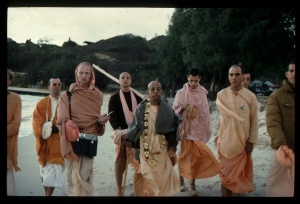CC Madhya 22.35: Difference between revisions
m (1 revision(s)) |
No edit summary |
||
| Line 1: | Line 1: | ||
{{ | [[Category:Sri Caitanya-caritamrta - Madhya-lila Chapter 22|C035]] | ||
<div style="float:left">'''[[Sri Caitanya-caritamrta|Śrī Caitanya-caritāmṛta]] - [[CC Madhya|Madhya-līlā]] - [[CC Madhya 22|Chapter 22: The Process of Devotional Service]]'''</div> | |||
<div style="float:right">[[File:Go-previous.png|link=CC Madhya 22.34|Madhya-līlā 22.34]] '''[[CC Madhya 22.34|Madhya-līlā 22.34]] - [[CC Madhya 22.36|Madhya-līlā 22.36]]''' [[File:Go-next.png|link=CC Madhya 22.36|Madhya-līlā 22.36]]</div> | |||
{{CompareVersions|CC|Madhya 22.35|CC 1975|CC 1996}} | |||
{{RandomImage}} | |||
==== TEXT 35 ==== | ==== TEXT 35 ==== | ||
<div | <div class="verse"> | ||
bhukti-mukti-siddhi-kāmī ‘subuddhi’ yadi haya | :bhukti-mukti-siddhi-kāmī ‘subuddhi’ yadi haya | ||
gāḍha-bhakti-yoge tabe kṛṣṇere bhajaya | :gāḍha-bhakti-yoge tabe kṛṣṇere bhajaya | ||
</div> | </div> | ||
| Line 12: | Line 16: | ||
==== SYNONYMS ==== | ==== SYNONYMS ==== | ||
<div | <div class="synonyms"> | ||
''bhukti''—of material enjoyment; ''mukti''—of impersonal liberation; ''siddhi''—of achieving mystic power; ''kāmī''—desirous; ''su-buddhi''—actually intelligent; ''yadi''—if; ''haya''—he is; ''gāḍha''—deep; ''bhakti-yoge''—by devotional service; ''tabe''—then; ''kṛṣṇere bhajaya''—worships Lord Kṛṣṇa. | |||
</div> | </div> | ||
| Line 19: | Line 23: | ||
==== TRANSLATION ==== | ==== TRANSLATION ==== | ||
<div | <div class="translation"> | ||
"Due to bad association, the living entity desires material happiness, liberation or merging into the impersonal aspect of the Lord, or he engages in mystic yoga for material power. If such a person actually becomes intelligent, he takes to Kṛṣṇa consciousness by engaging himself in intense devotional service to Lord Śrī Kṛṣṇa. | |||
</div> | </div> | ||
__NOTOC__ | |||
<div style="float:right; clear:both;">[[File:Go-previous.png|link=CC Madhya 22.34|Madhya-līlā 22.34]] '''[[CC Madhya 22.34|Madhya-līlā 22.34]] - [[CC Madhya 22.36|Madhya-līlā 22.36]]''' [[File:Go-next.png|link=CC Madhya 22.36|Madhya-līlā 22.36]]</div> | |||
__NOTOC__ | |||
__NOEDITSECTION__ | |||
Revision as of 12:12, 10 September 2021

His Divine Grace
A.C. Bhaktivedanta Swami Prabhupada
A.C. Bhaktivedanta Swami Prabhupada
TEXT 35
- bhukti-mukti-siddhi-kāmī ‘subuddhi’ yadi haya
- gāḍha-bhakti-yoge tabe kṛṣṇere bhajaya
SYNONYMS
bhukti—of material enjoyment; mukti—of impersonal liberation; siddhi—of achieving mystic power; kāmī—desirous; su-buddhi—actually intelligent; yadi—if; haya—he is; gāḍha—deep; bhakti-yoge—by devotional service; tabe—then; kṛṣṇere bhajaya—worships Lord Kṛṣṇa.
TRANSLATION
"Due to bad association, the living entity desires material happiness, liberation or merging into the impersonal aspect of the Lord, or he engages in mystic yoga for material power. If such a person actually becomes intelligent, he takes to Kṛṣṇa consciousness by engaging himself in intense devotional service to Lord Śrī Kṛṣṇa.